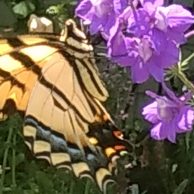
Some customers wonder why we are selling starts of self-sowing hardy annuals like Larkspur, Rocky Mt. Beeplant, California Poppy, Peony-flowered Poppy, Sweet Alyssum and Desert Bluebell. Shouldn’t they be grown from seed sown directly in the garden? The answer is Yes, they certainly can be, and if you find a source for the seeds and sow them at the optimal time, usually in the fall, you can get great results. But some gardeners report having little or no success with direct sowing: their timing is off, the seeds are watered in and then dry up and are no longer viable, critters eat the seeds, etc.
So it can be very worthwhile to get a patch started by planting the starts and letting them bloom, set seed, and distribute their seeds in your garden in their own time. Those first-year plants may not reach their full size because of transplanting shock (but you can minimize that by using a gentle hand and some mycorrhizae), but the subsequent self-sown plants should reach their full potential. Many of these annuals germinate in autumn and winter, growing deep roots while the soil is moist. Then the seed-leaves appear some time in winter or earliest spring, and these cold-hardy seedlings begin their top-growth. Most will bloom in spring. Some, like California Poppy, are likely to ‘perennialize’ here. We have California poppy plants that have thrived as perennials for many years. Your hardy annual patch should increase and thrive for at least several years, possibly decades!
